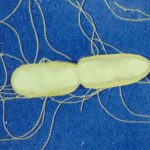Lien vers Pubmed [PMID] – 28348834
Microb Genom 2016 Nov;2(11):e000094
Estimating the rates at which bacterial genomes evolve is critical to understanding major evolutionary and ecological processes such as disease emergence, long-term host-pathogen associations and short-term transmission patterns. The surge in bacterial genomic data sets provides a new opportunity to estimate these rates and reveal the factors that shape bacterial evolutionary dynamics. For many organisms estimates of evolutionary rate display an inverse association with the time-scale over which the data are sampled. However, this relationship remains unexplored in bacteria due to the difficulty in estimating genome-wide evolutionary rates, which are impacted by the extent of temporal structure in the data and the prevalence of recombination. We collected 36 whole genome sequence data sets from 16 species of bacterial pathogens to systematically estimate and compare their evolutionary rates and assess the extent of temporal structure in the absence of recombination. The majority (28/36) of data sets possessed sufficient clock-like structure to robustly estimate evolutionary rates. However, in some species reliable estimates were not possible even with ‘ancient DNA’ data sampled over many centuries, suggesting that they evolve very slowly or that they display extensive rate variation among lineages. The robustly estimated evolutionary rates spanned several orders of magnitude, from approximately 10(-5) to 10(-8) nucleotide substitutions per site year(-1). This variation was negatively associated with sampling time, with this relationship best described by an exponential decay curve. To avoid potential estimation biases, such time-dependency should be considered when inferring evolutionary time-scales in bacteria.


